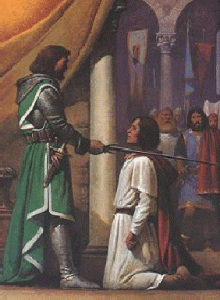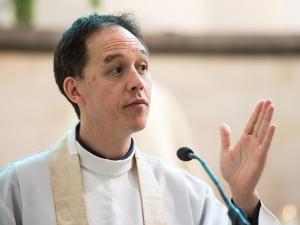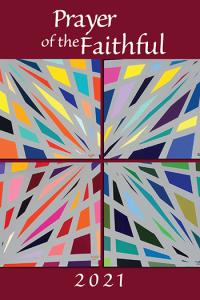Reminiscing theologically about bells because the parish of my childhood decided to fix the bells in the church steeple

“I got bells!” I said, and said it first, so there I was in my altar boy cassock and surplice, kneeling on the right side of the altar, the side with the bells. Not ordinary handbells, these were electric bells with five buttons to push. A few preliminary tasks done, having to do with wine and water in their cruets, and I’d be ready, kneeling, watching intently and a little nervously, for the four right occasions to push those buttons.
The easy one to miss was the Epiclesis, a term I didn’t know at the time. Of course, the big moment for bells was the Consecration. They would announce to the people, who otherwise might miss it, that the most dramatic moment of the Mass had arrived. I’d play three notes as the priest lifted up the consecrated Host. The scripted melody told the people to adore what appears to be bread but was in reality Jesus. Another melody marked the elevation of the chalice, containing the substance of Jesus again but, as for qualities one could detect, only ordinary wine.
Different messages
I wondered how those particular three-note melodies came about. Was it the same melody in any other parish? How could anyone decide which were the right notes? It was just part of the mystery of the Mass.
I was never shy about looking straight at the sacred species that I adored. Might as well look, as long as the priest is holding it up there. I read somewhere that in the Middle Ages devout worshipers in the back of the crowd would shout, “Sir priest, heave it higher.” But many people would bow their heads when they heard my bells, not being too comfortable with looking straight at divinity.
There were also the less devout, who took to heart the message of the last bell. This was rung at the priest’s Communion. The rule said It was complete Mass as long as at least one person received Communion. So having fulfilled, as we put it, the Sunday obligation, a person could get up and leave without committing a mortal sin. Bells have many different messages.
A Changing Church
Not everyone received Communion at those Masses. Some popes ago, Pius X, now a saint, had called for frequent Communion for everyone down to age 7. He wanted to reinvigorate the Church’s public worship. He encouraged active participation by the laity. For us that meant following along in our missals (named after St. Joseph or St. Andrew or even Pius X) in English. The priest spoke the real words of the Mass in Latin in a voice that servers had to be able to hear but not necessarily anybody else.
A lot has changed in the Church since those years. Some things just disappeared, including the security we felt during the long papacy of Pius XII. Somehow along with those major changes was a small matter – the disappearance of the electric bells that I loved to ring. The purpose that they served, when people had to be told about the important events taking place far away on the altar, no longer existed. The Liturgy had begun to be by the people and not just for them. We turned the altar around and moved it closer. We could see the priest’s face, see what he was doing with his hands, and hear and understand what he was saying.
So the bells went away because people knew without them what was happening. Sometime since, bells have worked their way back into the Liturgy in most parishes, and I don’t know why. At the Consecration they seem more like a distraction than an important announcement. It’s different for the Epiclesis, which I know now is the calling down of the Holy Spirit. It’s an important moment that’s as easy to miss as before. So a bell seems appropriate. Oddly very few parishes use the bell at that point.
Announcing the time God gives us
The place of bells in the Liturgy has changed, but in the church steeple, bells still peal to the city their message of passing time – that is, they did in my old parish church until the bells broke.
Where I grew up, that steeple was the highest thing around. It was fitting that time came from there – God’s time, a treasure God shared with us out of faith that we might put it to good use. Faith is a mysterious thing and no less so when it’s God who has faith in us.
We used to count those hourly bells. “Bong,” and we’d start counting: ONE . . . . . . . . .
That was the first hour after dinner. It said, “You have the whole afternoon ahead of you.” We youngsters would often be playing hopscotch on the sidewalk or riding bikes right under the steeple, across the street from home.
The oldest person on our block was Mrs. Runte. From her I learned that advice is something you don’t give unless it’s an emergency or somebody asks for it. She wasn’t talking to me, and she wasn’t actually giving advice. Instead, she told a story to my mother. It was about another lady who loved to give advice. One day she started giving Mrs. Runte advice about how to peel a carrot. I don’t know what happened to that lady after that, but Mrs. Runte lived to be very old, and it wasn’t from following somebody else’s advice.
Fix the bells?
Sunday mornings we had three Masses in our church. Then, in addition to the bells on the hour and quarter hour, there were the 5-minute warning bells. If you came to church much after that, you had to wait for the ushers to find you a seat or make one for you by getting people to squeeze together. We were all there, from one end of the block to the other. We had to go. The bells told us to — the same bells that announced where the time came from now telling us to give some of it back. Bells are exempt from that rule about giving advice.
People in that parish started thinking about bells when the question came up: Should we fix the old steeple bells? People no longer need a community clock to tell them the time. There had to be a more theological reason for restoring the bells in the steeple.
Bells for the high priest Aaron
You’d think the Bible would be the place to go for advice about most church matters, but I wonder if any committee looked there in this case. If they did, they might have been surprised. When you look up “bells” in a Bible concordance, you find a lot of “belly”s and “rebellion”s, but only two actual “bell”s. Both of them are in the Old Testament. One is about bells on horses, and the horses don’t seem to have much to do with worship. The other is an interesting passage about the clothes the High Priest Aaron had to wear when going into the Holy of Holies in the Temple:
All around the hem at the bottom you shall make pomegranates, woven of violet, purple and scarlet yarn and fine linen twined, with gold bells between them; first a gold bell, then a pomegranate, and thus alternating all around the hem of the robe. Aaron shall wear it when ministering, that its tinkling may be heard as he enters and leaves the LORD’S presence in the sanctuary; else he will die. (Exodus 28:33-
35)
For people who needed convincing on the bell matter, I’d call this a pretty impressive theological rationale.
A zap from the wholly Other?
Do we still believe this kind of thing? Would Aaron really have died without the bells? Once, according to another Old Testament story, the Ark of the Covenant, where God dwelt, was on its way back to Jerusalem. One of the crew, (he’d been warned not to touch the Ark under any circumstances) was unlucky enough to be right at the spot where the Ark started to tip. He reached out instinctively with his hand, stopped the Ark’s fall, and died instantly. Was that a zap from the all-holy God or just a very nervous Israelite?
When we say something is holy, that means, among other things, that it is really, really different. If two objects are different enough and they come in contact, it could be like matter and anti-matter. There’s an explosion. If you’re big enough – say, god-size — and the other guy is small enough, you probably won’t notice; but the other guy is no more. Could that be what happened to that unlucky Israelite?
In the 1950’s I was a kid with an interest in scientific ideas like that. There were new discoveries about the universe, new technologies, new powers coming into our grasp. I kept up on the latest speed and altitude records of the latest jets. I knew the difference between the A-bomb and the H-bomb, and I knew how many tons of TNT the newest ones were worth. American power, I thought, would soon solve the few trouble spots left in the world (one of them was Vietnam). They were minor matters compared to World War II, which we won. And then, no more war. I read that the “green revolution” was solving the problem of hunger. I read about “cloud seeding” to control the weather.
A universe with fear removed
From childhood on, I could read about the most powerful forces that nature displayed or humans invented and think of them all as curiosities to examine, study, measure, and eventually use. I could read about the strangest things — the smallest, the biggest, the farthest away, anti-matter, dark matter, missing matter – and they all became part of my world. The universe wasn’t an awesome, unimaginable stretch. It was a place, not so much bigger than my room, with all these interesting things in it.
A universe with fear removed does not do a good job of nurturing fear of God, and I don’t remember feeling much awe or fear of holy things. We had our taboos. Only the priest’s anointed hands were to touch the consecrated host, for example, and you didn’t get too close to the big altar with the presence of God on it in the tabernacle without a good reason. But the fear of punishment if I accidentally invaded some holy sphere where it wasn’t safe for a human to be – that’s something I never felt.
Not a tame God
Maybe I was missing something. By now my old optimism about the powers of science has faded. Many of our attempts to control nature and most of our attempts to control other people backfire. I don’t know if Aaron would have died without the bells, but Aaron knew something about the world and about God that I didn’t. It’s not a safe world, and God — for all that he loves us, and I’m sure Aaron knew it too – is not a tame God.
At any rate, now there are working bells in the steeple, and their ringing is a joyful invitation to come into the presence of God. But it also tells us that we’re doing something that’s not quite ordinary, and not quite safe. We’re leaving for a while an unsafe world with powers lurking both outside and inside ourselves that are beyond our control. But there is a stranger power in the Holy of Holies. Going to church is a step into that unknown. It’s a risk. It may even be a dying and rebirth to a new kind of life.
That’s enough to scare a person. Throughout history it has scared quite a number of the powers that be in this world. Maybe that’s a good enough reason for bells even at the Consecration.
Image credit: Wikipedia via Google Images












